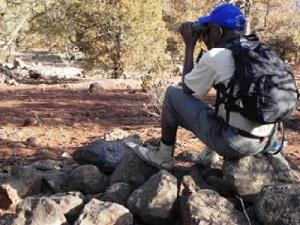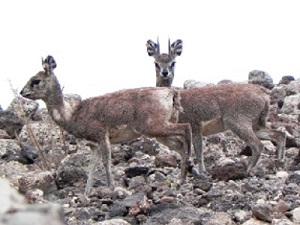Houssein Abdillahi Rayaleh
Other projects
10 Aug 2009
Improving our Ecological Knowledge to Aid Conservation of the Critically Endangered Djibouti Francolin in Djibouti
15 Jul 2013
National Awareness Campaign Using the Djibouti Francolin as a Flagship Species for the Conservation of Biodiversity in Djibouti
20 Apr 2020
Assessing the Feasibility of a Local Community Managed Protected Area Creation to Save the Critically Endangered Djibouti Francolin from Extinction
The project aims to consolidate the emerging conservation actions and significantly increase the understanding of the community to the threats on the Critically Endangered Djibouti francolin.

Houssein Abdillahi Rayaleh at work at the project site.
The Djibouti Francolin is an endemic bird species listed as Critically Endangered species (IUCN 2011) only known from two extremely small sites in Djibouti, which is severely fragmented and continues to decline in both extent and quality, and within which the population is suspected to be undergoing continuing decline and it means that if nothing is done, the species faces an extremely high risk of going extinct in the immediate future.

Other locally threatened species in the project site- Klipspringer (male and female).
The species’ main stronghold “the Forêt Du Day” is an Important Bird Area (BirdLife International, 2000) and proposed protected area lies. It consists also one of the few forested areas still remaining in the country where, historically, the dominant forest tree was Juniperus procera, which formed a closed canopy forest until a dramatic decline in the last 20-30 years which left a large proportion of dead or dying juniper trees; and the canopy open.
According to BirdLife International (Djibouti Francolin fact sheet 2006), an extremely rapid population decline of the species has been observed, exceeding 90%. This decline could continue into the near future, unless proposed conservation targets are addressed. The activities of the project aims to consolidate the emerging conservation actions and significantly increase the understanding of the community to the threats on the Critically Endangered Djibouti francolin for further secure its long term survival in the Goda mountain relict juniper forests which is its only natural habitats in Djibouti and in the world. It will provide also the stimulus that is desperately needed in Djibouti, in focusing attention and agreeing biodiversity priorities. The main expected outcomes are:
(1) Significant progress towards increased awareness and rising interest amongst community stakeholders in conservation of the critically endangered Djibouti Francolin and its degenerating natural habitats
(2) Capacity building of the emerging support site group established in the area from the previous works
(3) Community agreement to establish more stock enclosures to keep out livestock of parts of the forest
(4) the Djibouti Francolin ecological profile is improved. Those small above mentioned results want to be the backbone to enhance the commitment to safeguard what remains of the last remnant forest in Djibouti amongst the community living in and around the Forêt du Day Ecosystem.